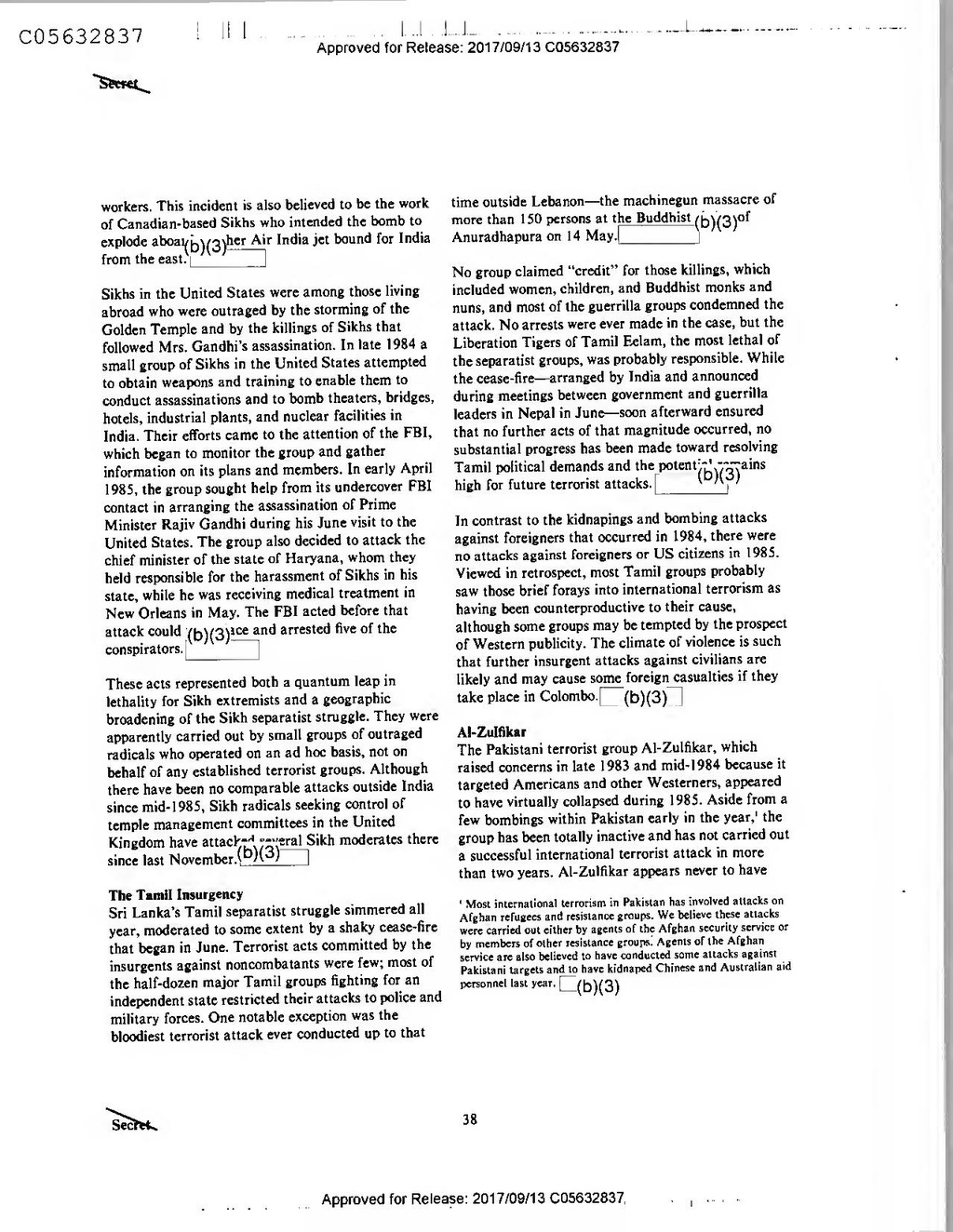Serret
workers. This incident is also believed to be the work of Canadian-based Sikhs who intended the bomb to
yher Air India jet bound for India from the east.
time outside Lebanon—the machinegun massacre of more than 150 persons at the Buddhist (b)(3)0f Anuradhapura on 14 May.
explode aboayb)(3)her
Sikhs in the United States were among those living abroad who were outraged by the storming of the Golden Temple and by the killings of Sikhs that followed Mrs. Gandhi's assassination. In late 1984 a small group of Sikhs in the United States attempted to obtain weapons and training to enable them to conduct assassinations and to bomb theaters, bridges, hotels, industrial plants, and nuclear facilities in India. Their efforts came to the attention of the FBI, which began to monitor the group and gather information on its plans and members. In early April 1985, the group sought help from its undercover FBI contact in arranging the assassination of Prime Minister Rajiv Gandhi during his June visit to the United States. The group also decided to attack the chief minister of the state of Haryana, whom they held responsible for the harassment of Sikhs in his state, while he was receiving medical treatment in New Orleans in May. The FBI acted before that attack could
(b)(3)ice
ce and arrested five of the conspirators.
No group claimed “credit" for those killings, which included women, children, and Buddhist monks and nuns, and most of the guerrilla groups condemned the attack. No arrests were ever made in the case, but the Liberation Tigers of Tamil Eelam, the most lethal of the separatist groups, was probably responsible. While the cease-fire-arranged by India and announced during meetings between government and guerrilla leaders in Nepal in June-soon afterward ensured that no further acts of that magnitude occurred, no substantial progress has been made toward resolving Tamil political demands and the potentnomains high for future terrorist attacks.
"(b)(3)
In contrast to the kidnapings and bombing attacks against foreigners that occurred in 1984, there were no attacks against foreigners or US citizens in 1985. Viewed in retrospect, most Tamil groups probably saw those brief forays into international terrorism as having been counterproductive to their cause, although some groups may be tempted by the prospect of Western publicity. The climate of violence is such that further insurgent attacks against civilians are likely and may cause some foreign casualties if they take place in Colombo. (b)(3)
These acts represented both a quantum leap in lethality for Sikh extremists and a geographic broadening of the Sikh separatist struggle. They were apparently carried out by small groups of outraged radicals who operated on an ad hoc basis, not on behalf of any established terrorist groups. Although there have been no comparable attacks outside India since mid-1985, Sikh radicals seeking control of temple management committees in the United Kingdom have attached coveral Sikh moderates there since last November.(b)(3)
Al-Zulfikar The Pakistani terrorist group Al-Zulfikar, which raised concerns in late 1983 and mid-1984 because it targeted Americans and other Westerners, appeared to have virtually collapsed during 1985. Aside from a few bombings within Pakistan early in the year,' the group has been totally inactive and has not carried out a successfUL international terrorist attack in more than two years. Al-Zulfikar appears never to have
The Tamil Insurgency Sri Lanka's Tamil separatist struggle simmered all year, moderated to some extent by a shaky cease-fire that began in June. Terrorist acts committed by the insurgents against noncombatants were few; most of the half-dozen major Tamil groups fighting for an independent state restricted their attacks to police and military forces. One notable exception was the bloodiest terrorist attack ever conducted up to that
Most international terrorism in Pakistan has involved attacks on Afghan refugees and resistance groups. We believe these attacks were carried out either by agents of the Afghan security service or by members of other resistance groups. Agents of the Afghan service are also believed to have conducted some attacks against Pakistani targets and to have kidnaped Chinese and Australian aid personnel last year. [(b)(3)
Secret
38
Approved for Release: 2017/09/13 C05632837,
